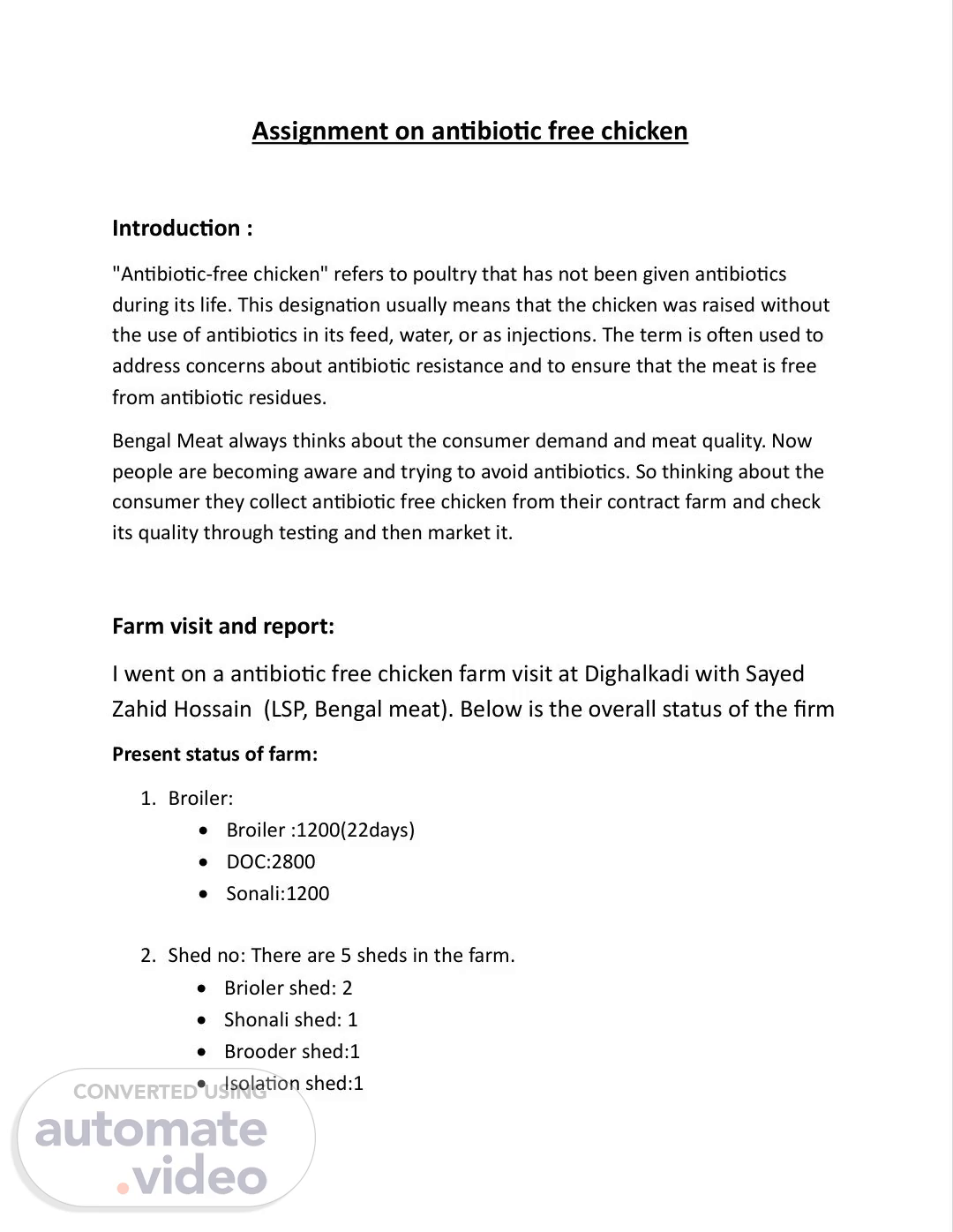Scene 1 (0s)
Assignment on antibiotic free chicken Introduction : "Antibiotic-free chicken" refers to poultry that has not been given antibiotics during its life. This designation usually means that the chicken was raised without the use of antibiotics in its feed, water, or as injections. The term is often used to address concerns about antibiotic resistance and to ensure that the meat is free from antibiotic residues. Bengal Meat always thinks about the consumer demand and meat quality. Now people are becoming aware and trying to avoid antibiotics. So thinking about the consumer they collect antibiotic free chicken from their contract farm and check its quality through testing and then market it. Farm visit and report: I went on a antibiotic free chicken farm visit at Dighalkadi with Sayed Zahid Hossain (LSP, Bengal meat). Below is the overall status of the firm Present status of farm: 1. Broiler: • Broiler :1200(22days) • DOC:2800 • Sonali:1200 2. Shed no: There are 5 sheds in the farm. • Brioler shed: 2 • Shonali shed: 1 • Brooder shed:1 • Isolation shed:1.
Scene 2 (44s)
Health assessment : Physical observation • Activity -Narmal • Feathers -Clean • Movement -Normal • Breathing-Normal Biosecurity Measures: The farm employs good biosecurity practices with a two-gate entry system. Visitors must pass through a disinfectant foot bath located between the gates, minimizing the risk of bringing in pathogens. Farm security is generally good, although some areas of the shed boundaries lack proper protection, potentially allowing predator entry. The sheds are well-designed with an East-West orientation that promotes good ventilation for the birds. The existing shed boundaries provide good protection from predators in most areas.Litter of the shed is slightly wet due to weater condition..
Scene 3 (1m 12s)
Despite the minor shortcomings in shed boundaries, the farm demonstrates a strong commitment to biosecurity. Implementing additional predator-proof measures in vulnerable areas would further enhance biosecurity. Management : Housing system: • Housing type:Open shed • Direction:East-West • Roof:Gable type and in good condition..
Scene 4 (1m 28s)
Litter management : • Litter matarial used: Rice hulls • Litter condition:Good but slightly wet due to weather condition. • Ltter replace: After 5-6 days. Vaccination : Name of vaccine Time(day) BCRDV+IB 5 days Gumbro 11days Gumbro(booster) 17 days BCRDV 21 days Feeding system of the farm : The farm utilizes a combination of commercially produced feed along with specific supplements for the broilers.They practice • Commercial feed • Prebiotic • Probiotic • Vitamin Apart from this, neem leaves and turmeric are fed as an alternative to antibiotics..
Scene 5 (1m 52s)
Medication : They do not use any antibiotics in Their farm. Cost analysis of previous flock: Bird:1200 Item Cost(tk) DOC(65*1200) 78000 Feed(57*3500) 199500 Supplement 4000 Total 281500 Item Ammount(tk) Bird sell(1055 birds) 268810 Total cost 281500 Loss 12690 *653.8kg sell 162tk per kg *1044.2kg sell 156tk per kg N.B: The farmer was saying that because the price of chicks was high, this batch was not profitable. But this is not always the case, sometimes such losses occur in broiler rearing, but if there is a profit in one or the other batch, it can be compensated. Bussiness analysis: As the cost of chicken rearing is high and the production is less than the standard antibiotic consumption, Bengal Meat collects from the farmers for Rs. 20 per kg more than the market price and provides technical advice on antibiotic free.
Scene 6 (2m 29s)
chicken rearing. Bengal Meat regularly tests and inspects farms to ensure quality, antibiotic-free meat. Conclusion: The visit to the antibiotic-free chicken farm at Dighalkadi provided a comprehensive overview of the practices and challenges associated with producing poultry without antibiotics. The farm's commitment to maintaining high standards of biosecurity, health, and management reflects its dedication to meeting consumer demands for antibiotic-free meat. The farm's infrastructure, including the well-maintained sheds and effective biosecurity measures, supports a healthy environment for the poultry, despite minor issues. Management practices, including regular vaccination schedules and a balanced diet of commercial feed supplemented with prebiotics, probiotics, and vitamins, contribute to the overall well-being of the flock. The use of alternative health measures, such as neem leaves and turmeric, highlights the farm's proactive approach to avoiding antibiotics..
